Benjamin M. Thomas, U.S. Indian Agent for the Pueblo Indian Agency, requests on behalf of the Pueblo Nation to take a delegation of eight individuals to visit their children at Carlisle and also to visit Washington D.C. Thomas also requests authority to bring two students to replace a Pueblo student who died at Carlisle and one who was returned…
Native Americans Visiting the School
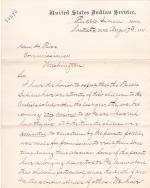
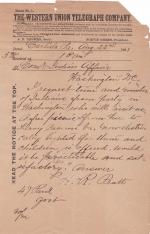
Richard Henry Pratt inquires into the number of visitors to expect from the delegation currently in Washington D.C. He also suggests that the delegation along with their children take a picnic to Luray Caverns in Virginia.
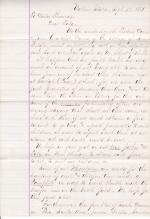
Benjamin M. Thomas, U.S. Indian Agent at the Pueblo Agency, forwards a petition from Juan Cristobal and Teodosio Duran to visit their children at Carlisle. They note they were the principal supporters of sending students to Carlisle and as a result have been persecuted by others. By visiting and reporting on the condition of their children they…
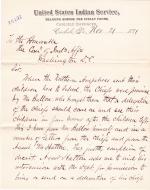
Richard Henry Pratt lends support to the request of the Northern Arapaho U.S. Indian Agent that the Chiefs from the Northern Arapaho be allowed to visit Carlisle as was promised when they sent their children. Pratt notes that Northern Arapaho students are excellent students and a visit from the Chiefs should serve to strengthen the argument of…
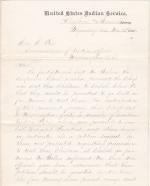
Charles Hatton, U.S. Indian Agent for the Northern Arapaho Agency, seeks authority to bring five Northern Arapaho Chiefs to Carlisle and Washington D.C. to visit their children. The Chiefs were promised when they sent their children that they would be allowed to visit and are seeking to have this promised fulfilled.
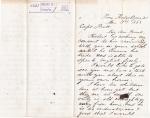
American Horse asks Richard Henry Pratt if he may come to Carlisle to visit his children attending the Carlisle Indian School. Pratt writes to the Commissioner of Indian Affairs that he believes American Horse coming to Carlisle would help keep his children in school for another two years and he would not need to be accompanied or spied upon.…
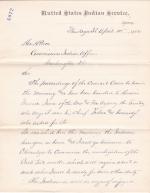
J. M. Haworth documents the visit of the Iowa Chiefs to Carlisle. He notes that he brought many of the students to Carlisle a few years earlier and comments on the many differences in the students over the course of their time at Carlisle.
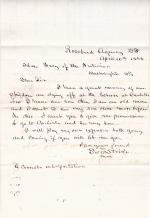
Two Strike requests permission to visit his son at the Carlisle Indian School.
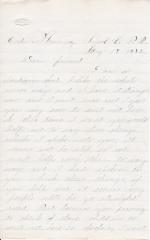
Richard Henry Pratt forwards a letter from Standing Bear after his arrival at the Carlisle Indian School. In the letter Pratt notes that Standing Bear believes that the school should return the children for the summer but that many of the younger ones are likely to be back in the fall. He also notes that Standing Bear wishes for the government…
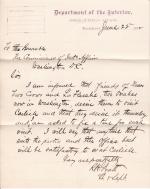
Richard Henry Pratt notes that Two Crows and La Flesche have requested to visit the Carlisle Indian School. Pratt writes that any time is satisfactory for Carlisle that suits Two Crows, La Flesche, and the Office of Indian Affairs.
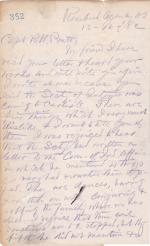
Cook writes to Richard Henry Pratt regarding Rosebud Agency and asking either for his daughter to be sent home or the funds to come visit her at Carlisle.
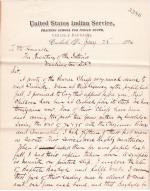
Richard Henry Pratt forwards a letter from Baptiste Bayhylle and Ralph J. Weeks regarding a request from a Pawnee Chiefs to visit Carlisle. Pratt provides some context to their request including the fact that many served as scouts during the war with the Cheyenne, Kiowas, and Comanches. He further states that preference should be given to those…

Request from the Cheyenne Agency for 80 children as well as 10 chiefs and police to visit the Carlisle Indian School.
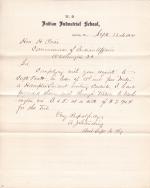
Alfred John Standing informs the Commissioner of Indian Affairs that he has provided a ticket for Miles, a Hampton Institute student, to visit the Carlisle Indian School.
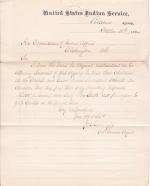
James G. Wright, U.S. Indian Agent for the Rosebud Agency, requests instructions for allowing Cook and Two Strike to visit their children at the Genoa and Carlisle Indian Schools. Both propose to pay their way and a note attached to the letter indicates there is no objection as long as Pratt agrees and there is no Government expense.
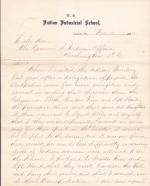
Richard Henry Pratt requests permission to allow two Arapaho Chiefs, Powder Face and Left Hand, as well as their wives to visit the Carlisle Indian School in the hopes of making it easier to allow families to send girls to the school by having women visit. In addition, Pratt proposes allowing two Cheyenne chiefs and their wives visit for the…
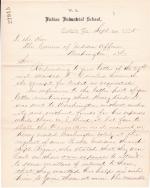
Alfred John Standing responds to an Office of Indian Affairs letter regarding a receipt for a ticket for Henry Kendall travel to Washington D.C.
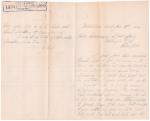
Two Strike requests to visit Washington D. C. with four other chiefs from the Sioux Agencies along with an interpreter. In addition to visiting Washington D. C. they hope to visit their children at Carlisle.
John Oberly writes that if given permission to visit Washington the group should be allowed to visit Carlisle. However, the…
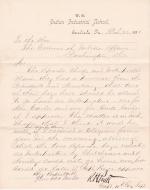
Richard Henry Pratt requests a telegram regarding a promise that the President and Secretary gave to a group of visiting Apache chiefs to send home two students at the Carlisle Indian School with them to serve as interpreters. Pratt recommends that the telegram say that the students will be sent at a future date.
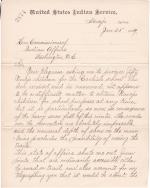
C. E. Vandever, U.S. Indian Agent for the Navajo Agency, responds to an Office of Indian Affairs telegram to have him secure 50 Navajo students for the Carlisle Indian School. Vandever notes that it is difficult to secure Navajo students in normal times but at present the snow makes travel impossible and that he hopes to be able to secure 25…
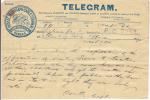
Richard Henry Pratt informs the Office of Indian Affairs that he understands the opposition of the visiting Sioux delegation to Eastern Schools. Pratt notes that when they come to the East they could see that assertions are incorrect.

Richard Henry Pratt informs the Office of Indian Affairs that it would be best to allow the Sioux Delegation to visit the Carlisle Indian School.

Richard Henry Pratt asks the Office of Indian Affairs how many individuals are in the new Sioux delegation.

Richard Henry Pratt requests from the Office of Indian Affairs information on if and when to expect the Sioux delegation at the Carlisle Indian School.
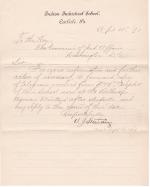
Alfred John Standing submits telegraph correspondence between himself and William P. Campbell regarding a request to have head men from the Fort Belknap Agency go East with a party as it would aid in recruiting students for Carlisle.
